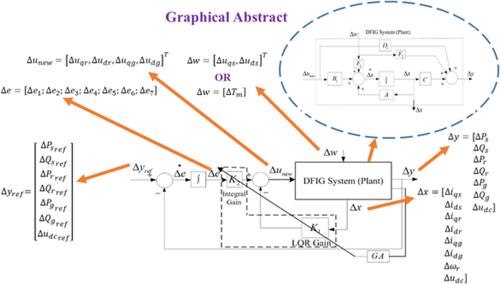当前位置:
X-MOL 学术
›
Int. Trans. Electr. Energy Syst.
›
论文详情
Our official English website, www.x-mol.net, welcomes your
feedback! (Note: you will need to create a separate account there.)
Disturbance rejection of the powers and DC‐link voltage of a doubly‐fed induction generator using state‐space based linear quadratic integral optimal control approach
International Transactions on Electrical Energy Systems ( IF 1.9 ) Pub Date : 2021-03-16 , DOI: 10.1002/2050-7038.12865 Ravi Bhushan 1 , Dipesh Kumar 2 , Kalyan Chatterjee 3
International Transactions on Electrical Energy Systems ( IF 1.9 ) Pub Date : 2021-03-16 , DOI: 10.1002/2050-7038.12865 Ravi Bhushan 1 , Dipesh Kumar 2 , Kalyan Chatterjee 3
Affiliation

|
In this paper, an optimal linear quadratic regulator (LQR)‐based integral controller (i.e., linear quadratic integral [LQI]) has been designed with an innovative approach for the tracking problems of a wind‐driven doubly‐fed induction generator (DFIG) system. The main objective of this controller is to reject the deviations that occurred in the DFIG powers together with the DC‐link voltage due to the perturbations in the stator voltage. The purpose of the inclusion of integral action with the well‐known modern optimal controller LQR is to guarantee zero steady‐state error for disturbance rejection/set‐point tracking. Further, the genetic algorithm (GA) technique is included for the optimal design of the LQI weighting matrices, which rapidly, as well as effectively rejects the disturbances from the system by regulating the augmented state variables. Therefore, to overcome these issues we have chosen the appropriate control model, which controls as a whole, that is, a multi‐input‐multi‐output (MIMO) system. The DFIG system is a MIMO system, which has been modeled in a state‐space approach in the d‐q axes rotating frame of reference. To examine the effectiveness and robustness of the suggested control strategy, small‐signal stability has been done by eigen values and participation factors method on digital simulations in the MATLAB/Simulink environment. Furthermore, the optimal control solutions have been tested under the various larger perturbations in the stator voltage and the mechanical torque. The comparative simulation results among the different controllers show that the proposed controller greatly enhances the dynamic performances and the robustness of the DFIG‐based wind energy systems (WES).
中文翻译:

使用基于状态空间的线性二次积分最优控制方法对双馈感应发电机的功率和直流链路电压进行干扰抑制
本文采用一种创新的方法设计了基于最优线性二次调节器(LQR)的积分控制器(即线性二次积分[LQI]),以解决风电双馈感应发电机(DFIG)的跟踪问题系统。该控制器的主要目的是消除由于定子电压的扰动而在DFIG电源中产生的偏差以及直流母线电压。著名的现代最优控制器LQR包含积分作用的目的是为了确保零稳态误差以用于干扰抑制/设定点跟踪。此外,还包括遗传算法(GA)技术,用于LQI加权矩阵的优化设计,该算法可以快速且有效地通过调节增强状态变量来有效地拒绝来自系统的干扰。因此,为克服这些问题,我们选择了合适的控制模型,该模型作为一个整体进行控制,即多输入多输出(MIMO)系统。DFIG系统是MIMO系统,已在状态空间方法中建模。d-q轴旋转参考系。为了检查所建议的控制策略的有效性和鲁棒性,在MATLAB / Simulink环境中,通过特征值和参与因子方法在数字仿真中实现了小信号稳定性。此外,已经在定子电压和机械转矩的各种较大扰动下测试了最佳控制解决方案。不同控制器之间的比较仿真结果表明,所提出的控制器大大提高了基于DFIG的风能系统(WES)的动态性能和鲁棒性。
更新日期:2021-05-03
中文翻译:

使用基于状态空间的线性二次积分最优控制方法对双馈感应发电机的功率和直流链路电压进行干扰抑制
本文采用一种创新的方法设计了基于最优线性二次调节器(LQR)的积分控制器(即线性二次积分[LQI]),以解决风电双馈感应发电机(DFIG)的跟踪问题系统。该控制器的主要目的是消除由于定子电压的扰动而在DFIG电源中产生的偏差以及直流母线电压。著名的现代最优控制器LQR包含积分作用的目的是为了确保零稳态误差以用于干扰抑制/设定点跟踪。此外,还包括遗传算法(GA)技术,用于LQI加权矩阵的优化设计,该算法可以快速且有效地通过调节增强状态变量来有效地拒绝来自系统的干扰。因此,为克服这些问题,我们选择了合适的控制模型,该模型作为一个整体进行控制,即多输入多输出(MIMO)系统。DFIG系统是MIMO系统,已在状态空间方法中建模。d-q轴旋转参考系。为了检查所建议的控制策略的有效性和鲁棒性,在MATLAB / Simulink环境中,通过特征值和参与因子方法在数字仿真中实现了小信号稳定性。此外,已经在定子电压和机械转矩的各种较大扰动下测试了最佳控制解决方案。不同控制器之间的比较仿真结果表明,所提出的控制器大大提高了基于DFIG的风能系统(WES)的动态性能和鲁棒性。











































 京公网安备 11010802027423号
京公网安备 11010802027423号